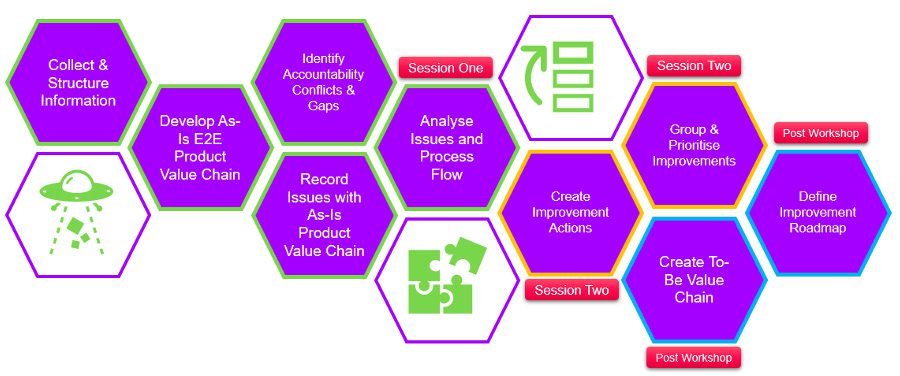A semiconductor and software design company based in the UK hired Enfuse Group to formalise their process accountabilities. Over the course of the engagement, the firm’s consultants helped create more than 20 improvement projects, helping the client rapidly improve its end-to-end production process.
A product value chain refers to the full lifecycle of a product or process, including material sourcing, production, consumption and disposal/recycling processes. For a company specialising in intellectual property, getting an idea from concept to delivery as quickly and smoothly as possible is vital – making the optimisation of product value chains essential.
One firm, specialising in the creation of semiconductor and software design, reached out to Enfuse Group to that end. The UK based company was looking to boost its product value chain, improving everything from ‘idea’ to ‘end-of-life’ design for a product. The firm tasked Enfuse with identifying inefficiencies within its processes, utilising process excellence methodologies.

According to a release from Enfuse’s website, the client’s main challenge was a “lack of clear vision” on how it operated to deliver products. This meant there was no transparent accountability processes in place, making it hard to pinpoint what issues were, where they occurred and who was even accountable for them. To help address this, Enfuse determined that high-level accountability across the product value chain and the product’s entire lifecycle should be tailored, to establish a clear path to process ownership, efficient handoffs, and process quality monitoring.
“We kicked off the project by collecting relevant information through discovery sessions,” Enfuse explained. “Here we interviewed the Subject Matter Experts from various functions, while also leveraging an APQC framework to determine the processes that make up their end-to-end product value chain. As well as defining their process structure, we also asked each function to claim accountability for the processes they believed their team to be accountable for.”
Alongside that process, Enfuse’s professionals also discussed the issues each of the client’s functions faced, while carrying out processes within the product value chain. All these issues were recorded in an issue and improvement register that constituted a key end-deliverable. Following these initial discovery sessions, Enfuse’s experts found various processes that nobody claimed accountability for, creating a gap, and others where more than one team had claimed accountability for, resulting in a conflict.
Enfuse then worked to identify the root causes by asking, ‘why, why and why again’. Once these had been agreed, the professionals brainstormed improvement ideas on how to address these issues – resulting in a detailed plan of action.
By the end of the engagement, Enfuse had created a high level end-to-end product value chain, which cut through functional silos, representing how the organisation operated from idea to end-of-life. As well as identifying and resolving 26 accountability gaps or conflicts, this saw the firm identify 34 issues across the product value chain, before assigning accountabilities to each process within the chain, and creating 23 improvement projects in the form of work packages to help the client build for the future.
“The accountability gaps and conflicts were resolved through discussions with the executive management board. Once theses hurdles had been addressed, we were able to communicate and embed these clear accountabilities to the wider organisation,” Enfuse’s release concluded. “By resolving the accountability gaps and the issues within the product value chain, we were able to identify what the ‘To-Be’ process should look like, allowing the organisation to deliver higher quality products more efficiently through an actionable improvement roadmap.”




